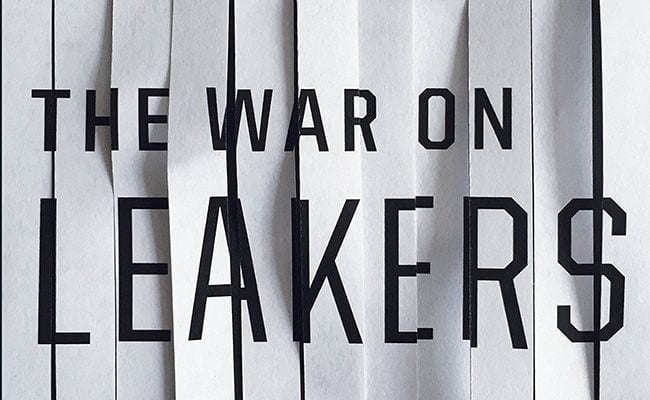
The ultimate irony that Lloyd Gardner’s new book The War on Leakers reveals, is that in the zealous pursuit of leakers by American officials over the past hundred years, one of the justifications is the importance of keeping the American public from losing confidence in its political system. This was one of the reasons for pursuing Pentagon Papers leaker Daniel Ellsberg in 1971, and for not dogging America down in an arduous (and allegedly political) debate on accountability for torture after 9/11. While both the Pentagon Papers and the revelations of torture have undeniably eroded public confidence in civic institutions, the zealous pursuit of men like Edward J. Snowden seems also to have resulted in a less confident and less trusting public.
From the passage of the US Espionage Act in 1917 through the prosecution of military draft critic Eugene v. Debs to the 35 year sentencing of Chelsea (formerly Bradley) Manning and the conviction of John Kiriakou and Jeffrey Sterling, Gardner takes readers through his argument in stages. It boils down to the premise that somewhere amid the intersection of American national security and American democracy, a (relatively) young intelligence apparatus ostensibly couched within the Executive Branch has jeopardized one in the name of the other.
Along the way, and through time, Gardner recruits some powerful voices in support of his argument: from Harry Truman’s 1964 warning that “Those fellas in the CIA don’t just report on wars … they go out and make their own and there’s nobody to keep track of what they’re up to”, to the more recent Senate floor denunciations by US Senators Dianne Feinstein and Mark Udall.
Time and again, Gardner demonstrates that government justifications (regardless of political stripe or administration) for the so-called War on Leakers go beyond tendentious into outright intellectual dishonesty. More perplexing is the alarming dissonance between the unique non-partisan nature of the Executive Branch’s diligent reliance on and vocal defense of the muscular intelligence apparatuses, and the degree to which each administration seems convinced that it can use it more responsibly than those in the other party. (As in the case of President Richard Nixon, who hoped to exploit the Vietnam revelations early on in order to entirely discredit the Democratic Party).
Gardner’s book could have benefitted from better chronological consistency, as it slips back and forth within the years of the Obama administration, repeating lines almost verbatim that previous chapters had already delivered. But the book carefully lays out the titular War on Leakers while avoiding getting bogged down in the ethical equating of leaking, say, details of a program to disrupt Iran’s nuclear capabilities, to that of mass surveillance programs of millions of uninformed American citizens (or European heads of state).
The tone is not prosecutorial, or even alarmist, but it is warning and frank. Gardner has not set out to denounce the entire establishment, and even when he articulates the worldview of some (e.g., Wikileaks’ Julian Assange) whose attacks border on an outright indictment of power itself, he never individually furthers this line of attack. Often, in fact, Gardner lets his subjects indict themselves. Frankly, none of them seem ashamed to utter lines such as: after the death of 3,000 people “I actually started to do different things. And I didn’t need to ask ‘mother, may I’ from the Congress or the President or anyone else” (General Michael Hayden).
Gardner makes an alarming case for the elusiveness of American democracy and the astounding ignorance in which it operates due, in part, to a combination of journalistic irresponsibility and government efforts to redefine what constitutes permissible “free press”. He illuminates aspects of the so-called War on Leakers that didn’t break through into headlines so dramatically, but should concern Americans just as much (e.g., LOVEINT, the purview of EO 12333, and the implications of the NSA’s information-sharing with “Unit 8200”).
So where does Gardner leave the reader? Should one take heart from the reforms that followed Snowden’s revelations and the cross-party cooperation among civil libertarian Republicans and progressive liberals? The jury’s still out. But important to the answer is one argument that simmered amid the Pentagon Papers revelations back in 1971: Americans couldn’t know how spectacularly wrong their leaders were about Vietnam or it might undermine their faith in their government and their leaders.
Can it not be reasonably said that this attitude played some role in producing our current period, in which voters seem to yearn for leaders who refuse to admit their mistakes, to the point of even denying words they uttered a day before? Voters don’t want leaders who doubt themselves, many don’t even want it pointed out that their leaders might have lied. If Gardner is right and a hollowing-out of American Presidential authority to the favor of the intelligence community has occurred, has it produced a Presidency in which we don’t even need presidents who understand national security, least of all the implications of their rhetoric?
As Johns Hopkins cryptography expert Matthew Green is recounted saying near the end of the book on a related topic, “It may be a means to an end, but it’s a hell of a means.”

